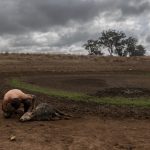 August 2, 2021 2:54 pm
Published by Climate Extremes
August 2, 2021 2:54 pm
Published by Climate Extremes
Climate change is affecting the amount of water evaporating (from soils and surfaces) and transpiring (evaporating through plant leaves) from the land surface. Trends derived from DOLCE V3 show clear increases in ET since 1980 over the majority of the Earth’s surface.
 July 2, 2021 1:49 pm
Published by Climate Extremes
July 2, 2021 1:49 pm
Published by Climate Extremes
Prof Julie Arblaster, Prof Lisa Alexander, and Assoc Prof Gab Abramowitz discuss the research around the Attribution and Risk research program. The episode explores why we can detect climate signals in some extreme weather events and not others and the implications this has for understanding how these events may change.
 November 27, 2020 9:34 am
Published by Climate Extremes
November 27, 2020 9:34 am
Published by Climate Extremes
This paper details a new approach to evaluating the performance of land surface models, the component of climate and weather models that simulates land surface processes. It focuses on the cycle of solar radiation during daylight hours and how the energy from the sun is exchanged between the land surface and lower atmosphere.
 June 10, 2020 3:05 pm
Published by Climate Extremes
June 10, 2020 3:05 pm
Published by Climate Extremes
Researchers have developed a hybrid approach to estimate recent rainfall that combines satellite-based rainfall estimates with satellite-based soil moisture estimates. When this approach was tested against independent rain gauge measurements it showed notable improvements.
 June 2, 2020 10:50 am
Published by Climate Extremes
June 2, 2020 10:50 am
Published by Climate Extremes
An analysis of new climate model projections by Australian researchers from the ARC Centre of Excellence for Climate Extremes shows southwestern Australia and parts of southern Australia will see longer and more intense droughts due to a lack of rainfall caused by climate change.
 April 15, 2020 10:26 am
Published by Climate Extremes
April 15, 2020 10:26 am
Published by Climate Extremes
This study presents a method for combining multiple observational datasets of the energy and water budgets at the land surface from different sources into a single hybrid dataset that conserves energy and mass.
 July 19, 2019 8:00 am
Published by Climate Extremes
July 19, 2019 8:00 am
Published by Climate Extremes
In this project, the student will learn more about the effects of the Millennium drought on the surface energy budget, particularly on the ratio of sensible heat flux to latent heat flux (i.e. SH/LH).
 March 4, 2019 3:55 pm
Published by Climate Extremes
March 4, 2019 3:55 pm
Published by Climate Extremes
This work examines how climate projections are affected by using different subsets of available climate models. The researchers find several variables need to be optimised independently to get the best results.
 February 7, 2019 4:06 pm
Published by Climate Extremes
February 7, 2019 4:06 pm
Published by Climate Extremes
The scientific community is moving away from “beauty contest” thinking where models are accepted or rejected on the basis of how well they simulate particular aspects of the present or past, toward a smarter approach that seeks to understand and exploit how present and future predictions are related as well as how different models are related.
 January 30, 2019 3:32 pm
Published by Climate Extremes
January 30, 2019 3:32 pm
Published by Climate Extremes
Together with a recent paper estimating evaporation and transpiration from the land surface, this paper brings the community a step closer to observationally constrained estimates of the historical land surface energy and water budgets









